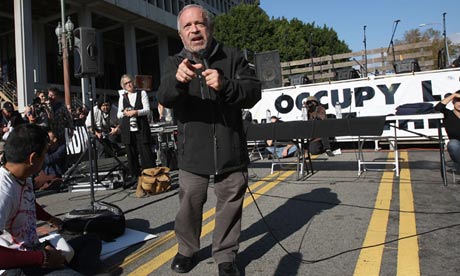The powerful documentary Inequality for All was an unexpected hit at the recent Sundance film festival, arguing that US capitalism has fatally abandoned the middle classes while making the super-rich richer. Can its star, economist Robert Reich, do for economics what Al Gore did for the environment?

Former US labour secretary Robert Reich at an Occupy Los Angeles rally in 2011. Photograph: David Mcnew/Getty Images
In one sense, Inequality for All is absolutely the film of the moment. We are living through tumultuous times. The economy has tanked. Austerity has cut a swath through the country. We're on the verge of a triple-dip recession. And, in another, parallel universe, a small cohort of alien beings – or as we know them, bankers – are currently engaged in trying to figure out what to spend their multimillion-pound bonuses on. Who wouldn't want to know what's going on? Or how it happened? Or why? Or if it is really true that the next generation down is well and truly shafted?
And yet… what sucker would try to make a film about it? It's not exactly Skyfall. Where would you even start? Because there are some films that practically beg to be made. And then there's Inequality for All; the kind of film that you can't quite believe that anybody, ever, considered a good idea, let alone had the passion and commitment to give it two years of their life.
How did you even come up with the idea of making a film about economics? I ask the director Jacob Kornbluth. "I know! People would roll their eyes when I told them. They'd say it's a terrible idea for a film." On paper it is, indeed, a terrible idea. A 90-minute documentary on income inequality: or why the rich have got richer and the rest of us haven't (I say "us" because although it's focused on America, we're snapping at their heels) and which traces a line back to the 1970s, when things stopped getting better for the vast majority of ordinary working people and started getting worse.
"It always sounded so dry," says Kornbluth. "But then I'd tell people it's An Inconvenient Truth for the economy and they'd go, Ah!"
In fact, Inequality for All, which premiered at the Sundance film festival a fortnight ago, is anything but dry. It won not just rave reviews but also the special jury prize and a major cinema distribution deal, and while it owes an obvious debt to Al Gore's An Inconvenient Truth, it is, in many ways, a much better, more human and surprising film. Not least because, incredibly enough, it's actually pretty funny. And, in large part, this is down to its star, Robert Reich.
Reich is not a star in any obvious sense of the word. He's a 66-year-old academic. And he's been banging on about inequality for more than three decades. At one point in the film he looks quite downcast and says: "Sometimes I just feel like my life has been a total failure." An archive clip of him on CNN from 1991 looking fresh-faced and bushy-haired shows that he has literally been saying the same thing for decades upon decades. And yet, as he tells me cheerfully on the phone from his home in California, "It just keeps getting worse!"These days he's a professor of public policy at the University of California at Berkeley and while he's not a figure we're familiar with in the UK, he's been part of American public life for years. At the start of the film, he introduces himself to a lecture hall full of students, telling them how he was secretary of labour under Bill Clinton. "And before that I was at Harvard. And before that I was a member of the Carter administration. You don't remember the Carter administration, do you?" The students remain silent. "And before that," says Reich with impeccable comic timing, "I was a special agent for Abraham Lincoln." He shakes his head. "Those were tough times."
Reich's books and ideas have been at the forefront of Democratic party thinking for a generation. He is an intellectual heavyweight, a veteran policymaker, a seasoned political hand, and yet he also has the delivery of a standup comedian. His ideas were the basis for Bill Clinton's 1992 election campaign slogan, "Putting People First" (they were both Rhodes scholars and he met Clinton on board the boat to England; he once dated Hillary too, though he only realised this when a New York Times journalist rang him up and reminded him). And they were still there at the heart of President Obama's inaugural address last month. America could not succeed, said Obama, "when a shrinking few do very well and a growing many barely make it". What Reich, basically, has been saying since the year dot.
What's extraordinary is how, somehow, these ideas have been translated into a narrative that shows every sign of being this year's hit documentary film. It certainly shocked Reich. He says he was amazed when Kornbluth first pitched the idea of a film. "He came and said that he'd read my book, Aftershock, and that he loved it and wanted to do a movie about it. And I honestly didn't know what he meant. How could you make a movie out of it?"
But Kornbluth has made a movie out of it. A really astonishingly good movie that takes some big economic ideas and how these relate to the quality of everyday life as lived by most ordinary people. The love and care and artistic flair that Kornbluth brought to it is evident in every frame. It was really really hard work, he tells me, to make something look that simple. But then "I grew up poor. So I've always been very aware of who has what in society." His father had a stroke when Kornbluth was five and died six years later. And his mother, who didn't work because she was raising three children, died when he was 18.Any synopsis of the film runs the risk of making it seem dry again, but essentially it describes how the middle classes have come to have a smaller and smaller portion of the economic pie. And how, since 70% of the economy is based on the middle classes buying stuff, if they don't have any money to buy this stuff, it cannot grow. Meanwhile, the government has allowed the super-rich, the "one per cent", to take more of the nation's wealth. Half of the US's total assets are now owned by just 400 people – 400! – and, Reich contests that this is not just a threat to the economy, but also to democracy.
A comment from the Blogger.
I think we should try to "bribe" the rich, and the super rich companies to move in a more ethical, and environmentally sustainable direction using something like Transfinancial Economics. Trying to "overthrow" them somehow via the present politcial process in the USA seems to me at present largely a "waste of time." With TFE a far more pragmatic approach is required in which new money could be created electronically, and without serious inflation to deal with the funding in full, or in part of poverty reuduction type projects. But this demands an understanding of TFE which requires real intelligence, and real vision...both of which are totally lacking in present day economics.....................
Also to further add the following point connected with the above.... TFE could reduce poverty dramatically without having to "rob" anyone irrespective of whether they are rich, or poor.
http://www.p2pfoundation.net/Transfinancial_Economics
Transfinancial Economics is an evolving project nearing basic completion. It should be said that there has been a degree of interest in it from some economists including Professor Prem Sikka, and the noted autodidact, and futurist Hazel Henderson.In April 2010 it was also a subject discussed at a ma...


No comments:
Post a Comment